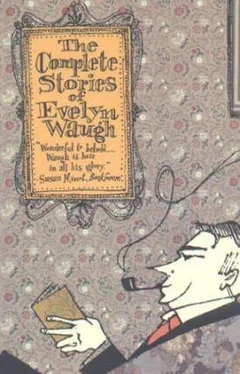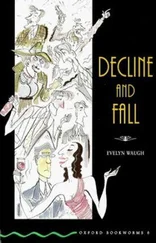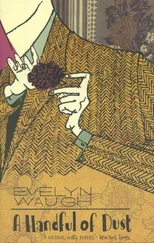Evelyn Waugh - The Complete Stories Of Evelyn Waugh
Здесь есть возможность читать онлайн «Evelyn Waugh - The Complete Stories Of Evelyn Waugh» весь текст электронной книги совершенно бесплатно (целиком полную версию без сокращений). В некоторых случаях можно слушать аудио, скачать через торрент в формате fb2 и присутствует краткое содержание. Год выпуска: 1998, ISBN: 1998, Жанр: Классическая проза, на английском языке. Описание произведения, (предисловие) а так же отзывы посетителей доступны на портале библиотеки ЛибКат.
- Название:The Complete Stories Of Evelyn Waugh
- Автор:
- Жанр:
- Год:1998
- ISBN:0-316-92546-2
- Рейтинг книги:3 / 5. Голосов: 1
-
Избранное:Добавить в избранное
- Отзывы:
-
Ваша оценка:
- 60
- 1
- 2
- 3
- 4
- 5
The Complete Stories Of Evelyn Waugh: краткое содержание, описание и аннотация
Предлагаем к чтению аннотацию, описание, краткое содержание или предисловие (зависит от того, что написал сам автор книги «The Complete Stories Of Evelyn Waugh»). Если вы не нашли необходимую информацию о книге — напишите в комментариях, мы постараемся отыскать её.
The Complete Stories Of Evelyn Waugh — читать онлайн бесплатно полную книгу (весь текст) целиком
Ниже представлен текст книги, разбитый по страницам. Система сохранения места последней прочитанной страницы, позволяет с удобством читать онлайн бесплатно книгу «The Complete Stories Of Evelyn Waugh», без необходимости каждый раз заново искать на чём Вы остановились. Поставьте закладку, и сможете в любой момент перейти на страницу, на которой закончили чтение.
Интервал:
Закладка:
In the same way with his food, he wished to try all the dishes. If he found he did not like anything, he ordered something else. On the first evening we dined out he decided that champagne was tasteless and disagreeable and refused to drink it again. He had no patience for acquiring tastes, but most good things pleased him immediately. At the National Gallery he would look at nothing after Bellini’s “Death of Peter Martyr.”
He was an immediate success with everyone I introduced him to. He had no “manner” of any kind. He said all he thought with very little reticence and listened with the utmost interest to all he heard said. At first he would sometimes break in with rather disturbing sincerity upon the ready-made conversations with which we are mostly content, but almost at once he learned to discern what was purely mechanical and to disregard it. He would pick up tags and phrases and use them with the oddest twists, revitalizing them by his interest in their picturesqueness.
And all this happened in four days; if it had been in four months the change would have been remarkable. I could see him developing from one hour to the next.
On our last evening in London I brought out an atlas and tried to explain where we were going. The world for him was divided roughly into three hemispheres—Europe, where there had been a war; it was full of towns like Paris and Buda-Pest, all equally remote and peopled with prostitutes; the East, a place full of camels and elephants, deserts and dervishes and nodding mandarins; and America, which besides its own two continents included Australia, New Zealand, and most of the British Empire not obviously “Eastern”; somewhere, too, there were some “savages.”
“We shall have to stop the night at Brindisi,” I was saying. “Then we can get the Lloyd Trestino in the morning. What a lot you’re smoking!”
We had just returned from a tea and cocktail party. George was standing at the looking glass gazing at himself in his new clothes.
“You know, he has made this suit rather well, Ernest. It’s about the only thing I learned at home—smoking, I mean. I used to go up to the saddle room with Byng.”
“You haven’t told me what you thought of the party.”
“Ernest, why are all your friends being so sweet to me? Is it just because I’m going to be a duke?”
“I expect that makes a difference with some of them—Julia for instance. She said you looked so fugitive.”
“I’m afraid I didn’t like Julia much. No, I mean Peter and that funny Mr. Oliphant.”
“I think they like you.”
“How odd!” He looked at himself in the glass again. “D’you know, I’ll tell you something I’ve been thinking all these last few days. I don’t believe I really am mad at all. It’s only at home I feel so different from everyone else. Of course I don’t know much… I’ve been thinking, d’you think it can be grandfather and the aunts who are mad, all the time?”
“They’re certainly getting old.”
“No, mad. I can remember some awfully dotty things they’ve done at one time or another. Last summer Aunt Gertrude swore there was a swarm of bees under her bed and had all the gardeners up with smoke and things. She refused to get out of bed until the bees were gone—and there weren’t any there. And then there was the time grandfather made a wreath of strawberry leaves and danced round the garden singing ‘Cook’s son, Dook’s son, son of a belted earl.’ It didn’t strike me at the time, but that was an odd thing to do, wasn’t it? Anyway, I shan’t see them again for months and months. Oh, Ernest, it’s too wonderful. You don’t think the sleeves are too tight, do you? Are people black in Athens?”
“Not coal black—mostly Jews and undergraduates.”
“What’s that?”
“Well, Peter’s an undergraduate. I was one until a few weeks ago.”
“I say, do you think people will take me for an undergraduate?”
IV
It seems to me sometimes that Nature, like a lazy author, will round off abruptly into a short story what she obviously intended to be the opening of a novel.
Two letters arrived for me by the post next morning. One was from my bank returning the Duke’s cheque for £150 marked “Payment Stopped”; the other from a firm of solicitors enjoining me that they, or rather one of them, would call upon me that morning in connection with the Duke of Vanburgh’s business. I took them in to George.
All he said was: “I had a sort of feeling that this was all too good to last.”
The lawyer duly arrived. He seemed displeased that neither of us was dressed. He intimated that he wished to speak to me alone.
His Grace, he said, had altered his plans for his grandson. He no longer wished him to go abroad. Of course, between ourselves we had to admit that the boy was not quite sane… very sad… these old families… putting me in such a difficult position in case anything happened….. His Grace had talked it over with Lady Emily and Lady Gertrude….. It really was too dangerous an experiment… besides, they had especially kept the boy shut away because they did not want the world to know… discredit on a great name… and, of course, if he went about, people were bound to talk. It was not strictly his business to discuss the wisdom of his client’s decision, but, again between ourselves, he had been very much surprised that his Grace had ever considered letting the boy leave home….. Later perhaps, but not yet… he would always need watching. And of course there was a good deal of money coming to him. Strictly between ourselves, his Grace was a great deal better off than people supposed… town property… death duties… keeping up Stayle… and so on.
He was instructed to pay the expenses incurred up to date and to give me three months’ salary… most generous of his Grace, no legal obligation….. As to the clothes… we really seemed rather to have exceeded his Grace’s instructions. Still, no doubt all the things that had not been specially made could be returned to the shops. He would give instructions about that… he was himself to take Lord Stayle back to his grandfather.
And an hour later they left.
“It’s been a marvellous four days,” said George; and then: “Anyway, I shall be twenty-one in three years and I shall have my mother’s money then. I think it’s rather a shame sending back those ties though. Don’t you think I could keep one or two?”
Five minutes later Julia rang up to ask us to luncheon.
THE MANAGER OF “THE KREMLIN”
This story was told me in Paris very early in the morning by the manager of a famous night club, and I am fairly certain that it is true.
I shall not tell you the real name of the manager or of his club, because it is not the sort of advertisement he would like, but I will call them, instead, Boris and “The Kremlin.”
“The Kremlin” occupies a position of its own.
Your hat and coat are taken at the door by a perfectly genuine Cossack of ferocious appearance; he wears riding boots and spurs, and the parts of his face that are not hidden by beard are cut and scarred like that of a pre-war German student.
The interior is hung with rugs and red, woven stuff to represent a tent. There is a very good tsigain band playing gipsy music, and a very good jazz-band which plays when people want to dance.
The waiters are chosen for their height. They wear magnificent Russian liveries, and carry round flaming skewers on which are spitted onions between rounds of meat. Most of them are ex-officers of the Imperial Guard.
Boris, the manager, is quite a young man; he is 6 ft. 5 1/2 in. in height. He wears a Russian silk blouse, loose trousers and top boots, and goes from table to table seeing that everything is all right.
Читать дальшеИнтервал:
Закладка:
Похожие книги на «The Complete Stories Of Evelyn Waugh»
Представляем Вашему вниманию похожие книги на «The Complete Stories Of Evelyn Waugh» списком для выбора. Мы отобрали схожую по названию и смыслу литературу в надежде предоставить читателям больше вариантов отыскать новые, интересные, ещё непрочитанные произведения.
Обсуждение, отзывы о книге «The Complete Stories Of Evelyn Waugh» и просто собственные мнения читателей. Оставьте ваши комментарии, напишите, что Вы думаете о произведении, его смысле или главных героях. Укажите что конкретно понравилось, а что нет, и почему Вы так считаете.












